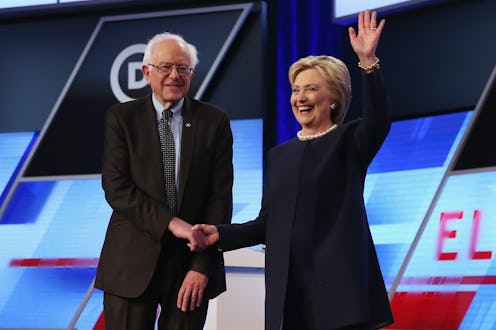News
Why Sanders Won't Be Clinton's VP Pick
With Monday's big win, Hillary Clinton's closer than ever to the Democratic nomination. As she gears up to become the nominee, speculation about her vice president pick has geared up, but there's little doubt that Clinton won't pick Bernie Sanders for vice president.
Even before Tuesday's primaries, claims that a Clinton-Sanders ticket would unify Democrats abounded. The logic, supporters of the unlikely pairing argued, lies in Clinton's need to appeal to the party's growing progressive base that ravenously supports the Vermont senator's presidential bid. Jane Sanders, the Vermont senator's wife, has said as much: the Democratic agenda has changed, and a progressive vice presidential candidate is the best way to avert a Donald Trump presidency. Sanders himself said he'd consider being vice president to Clinton if he loses the nomination. Clinton, however, sang a different tune, declining to answer whether she was considering Sanders when CNN's Chris Cuomo asked her during an interview in May.
There are a number of reasons a Clinton-Sanders ticket is unlikely. The main reason, however, is that Sanders supporters wouldn't have it. These people have spent months obsessively rallying around their candidate and, to a great extent, directing their outrage towards "the establishment" at Clinton as well. Sanders supporters, in their distrust of Clinton, would likely view a Sanders VP pick as pandering and reject the candidate wholesale, choosing to sit out the general election or worse, vote for Trump. As CNN contributor Sally Kohn so aptly stated, vice presidential running mates are supposed to help their nominee win the presidency, and some Sanders supporters, in their fervor, could vote Trump over Clinton.
Although claims of potential Sanders-to-Trump defection are largely overblown, the precedent they set is telling: the anti-establishment rhetoric that Trump and Sanders have set in motion on opposite but bizarrely similar sides of the aisle are evidence of the anger bubbling just under the surface of their large electorates. On the left, that anger is directed towards perceived oppression at the hands of a broken and corrupt system; on the right, that anger is also directed at the system, but has taken a very different, and largely bigoted, form.
The Sanders' camp's deep mistrust of Clinton is eclipsed only by their disgust with capitalism, a belief that should bar them from voting for Trump, the poster boy for free trade corruption, on principle. This should be heartening to doomsday analysts who foresee a dystopia in which angry Sanders supporters rally around Trump in an effort to bring down the establishment (playing into what leftist critics call "accelerationism," or the acceleration of capitalism to its absolute end in an attempt to bring down capitalism as quickly as possible).
There's no doubt that Sanders changed the game this election season, perhaps even more than Barack Obama did in 2008. Clinton would be wise to pick a VP similar to Sanders to capture his base, but not Sanders himself. If nothing else, she will need to capture a part of his electorate using the agenda he set, and that's reason enough to celebrate.
